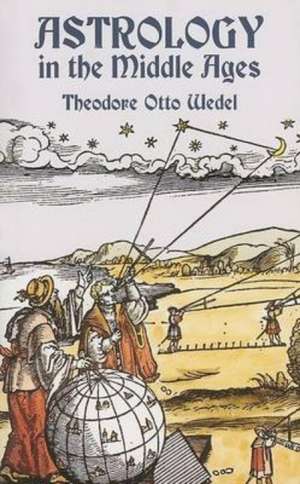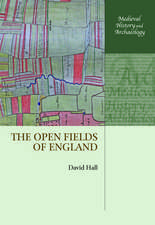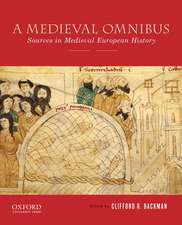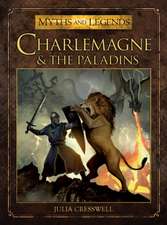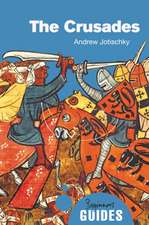Astrology in the Middle Ages: Dover Occult
Autor THEODORE OTTO WEDELen Limba Engleză Paperback – 30 iun 2005
This volume traces the development of medieval conceptions of astrology from the fifth through fifteenth centuries, highlighted by the twelfth century's sudden revival of Aristotelian and Arabic learning, which heralded the scholastic age. It places particular emphasis on the conflict between ecclesiastical doctrine, inherited from the ancient church, and the growing demands of Arabic science. Enlightening interpretations of astrological references from a fascinating variety of literary sources comprise extracts from medieval romances and the works of Chaucer."
Din seria Dover Occult
- 16%
 Preț: 67.07 lei
Preț: 67.07 lei - 16%
 Preț: 45.15 lei
Preț: 45.15 lei -
 Preț: 79.38 lei
Preț: 79.38 lei - 15%
 Preț: 115.69 lei
Preț: 115.69 lei -
 Preț: 110.88 lei
Preț: 110.88 lei -
 Preț: 134.15 lei
Preț: 134.15 lei - 16%
 Preț: 45.86 lei
Preț: 45.86 lei - 10%
 Preț: 118.46 lei
Preț: 118.46 lei -
 Preț: 110.90 lei
Preț: 110.90 lei -
 Preț: 60.61 lei
Preț: 60.61 lei -
 Preț: 83.28 lei
Preț: 83.28 lei -
 Preț: 164.76 lei
Preț: 164.76 lei - 15%
 Preț: 78.60 lei
Preț: 78.60 lei -
 Preț: 88.87 lei
Preț: 88.87 lei -
 Preț: 64.30 lei
Preț: 64.30 lei - 22%
 Preț: 132.56 lei
Preț: 132.56 lei - 15%
 Preț: 123.74 lei
Preț: 123.74 lei - 18%
 Preț: 144.45 lei
Preț: 144.45 lei -
 Preț: 85.00 lei
Preț: 85.00 lei -
 Preț: 83.69 lei
Preț: 83.69 lei
Preț: 68.64 lei
Nou
Puncte Express: 103
Preț estimativ în valută:
13.14€ • 13.66$ • 10.84£
13.14€ • 13.66$ • 10.84£
Carte disponibilă
Livrare economică 24 martie-07 aprilie
Preluare comenzi: 021 569.72.76
Specificații
ISBN-13: 9780486436425
ISBN-10: 048643642X
Pagini: 163
Dimensiuni: 154 x 217 x 9 mm
Greutate: 0.26 kg
Editura: Dover Publications
Seria Dover Occult
ISBN-10: 048643642X
Pagini: 163
Dimensiuni: 154 x 217 x 9 mm
Greutate: 0.26 kg
Editura: Dover Publications
Seria Dover Occult
Textul de pe ultima copertă
Astrology occupies a prominent place in the history of philosophy and science. Thirteenth-century scholars even more than the poets and philosophers of ancient Greece and Rome regarded the rule of the stars over human destiny as an indisputable fact, entering into their every conception of the universe. Theologians credited the stars with a power second only to that of God. Astrology offered a reasoned explanation of an infinite diversity of physical phenomena, and included psychology and ethics within its scope.
This volume traces the development of medieval conceptions of astrology from the fifth through fifteenth centuries, highlighted by the twelfth century's sudden revival of Aristotelian and Arabic learning, which heralded the scholastic age. It places particular emphasis on the conflict between ecclesiastical doctrine, inherited from the ancient church, and the growing demands of Arabic science. Enlightening interpretations of astrological references from a fascinating variety of literary sources comprise extracts from medieval romances and the works of Chaucer.
Dover (2005) unabridged republication of "The Mediaeval Attitude Toward Astrology, Particularly in England, "Yale University Press, New Haven, 1920."
This volume traces the development of medieval conceptions of astrology from the fifth through fifteenth centuries, highlighted by the twelfth century's sudden revival of Aristotelian and Arabic learning, which heralded the scholastic age. It places particular emphasis on the conflict between ecclesiastical doctrine, inherited from the ancient church, and the growing demands of Arabic science. Enlightening interpretations of astrological references from a fascinating variety of literary sources comprise extracts from medieval romances and the works of Chaucer.
Dover (2005) unabridged republication of "The Mediaeval Attitude Toward Astrology, Particularly in England, "Yale University Press, New Haven, 1920."
